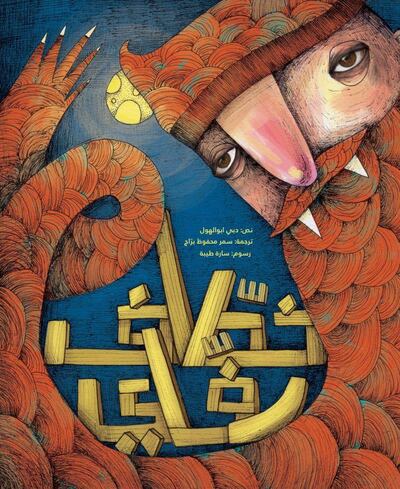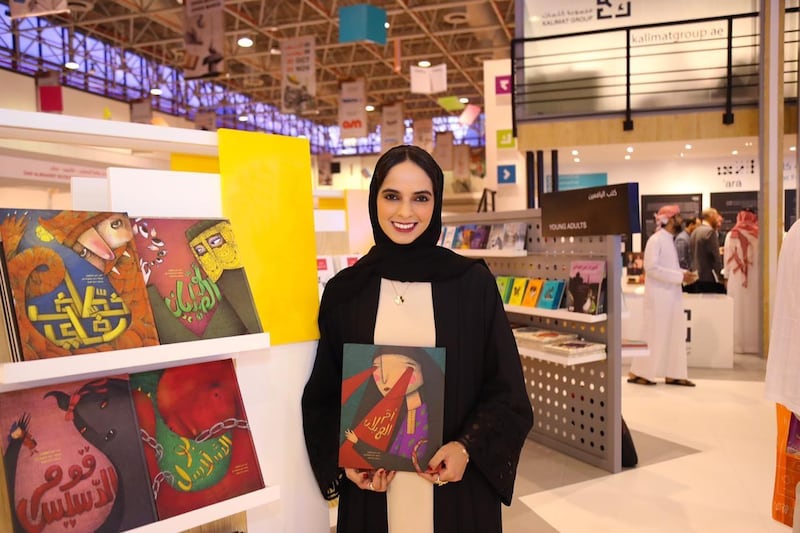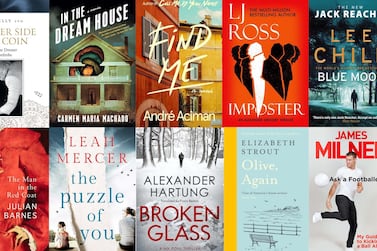When Dubai Abulhoul was a child, her parents would read her bedtime stories. Among her favourites were Goldilocks and the Three Bears and Little Red Riding Hood. But Abulhoul didn't recognise herself in these tales. "I would have loved to read something that I could relate to as an Emirati," she says.
Now 23, Abulhoul is taking steps to put this right. She has written a series of children's books, published in Arabic by Kalimat Group, celebrating Emirati folklore and the local jinn, or spirit beings, that haunt our dreams. There is a sea monster, a family whose faces alter horrifically when exposed to sunlight and a mysterious creature in chains who clanks around the souqs after dark.
But don't be afraid. These jinn, claims Abulhoul, are simply misunderstood. All they really want is to be accepted. "The jinn have a reputation of being evil," she says. "What drew me to them is the fact that there is no background story explaining why they are evil.

“I decided to give them alternative narratives, in order to teach children that, just because you’ve heard that someone is bad, it does not necessarily mean that they are. It is about the importance of tolerance. The more I reflected on it as a writer, the more I realised I had a responsibility to start this project.”
There are five books in the series, beautifully illustrated by Saudi Arabian artist Sarah Taibah, the latest of which, Um Hailan, was launched at the Sharjah International Book Fair earlier this month. Um Hailan is an orphan whose only possession is her mother's wedding dress, which she carries around in a suitcase. Um Hailan also has a terrible secret: she is able to set fire to things with her eyes or "evil glance", a curse she inherited from her mother.
When she sees another child opening a pile of gifts, Um Hailan is overcome with jealously and, using that “evil glance”, burns all the gifts.
Exposed as a jinn, she is forced to flee the village, only finding redemption years later when, after accidentally burning her friend's wedding dress, she replaces it with the one belonging to her mother. Um Hailan is invited to the wedding and welcomed back into the community.
"I had an interesting experience reading Um Hailan to a group of children," says Abulhoul. "I told them I was going to read them a story about a djinn and they were all like, 'No!' And then towards the end, they told me, 'She's not evil, she's just misunderstood.' You see that shift."
Each story follows this arc of banishment and redemption. In Khattaf Raffay, the third book in the series, a young djinn harbours dreams of becoming a sailor. He has a problem, though: at night, he transforms into an enormous sea monster. When the crew he joins discover this, they abandon Khattaf Raffay at sea. A storm arrives that night and Khattaf Raffay tries to rescue the crew but, because of his size, makes the situation worse.
Eventually, Khattaf Raffay manages to save a different crew by persuading them to hang onto a rope, with which he drags the stricken boat to shore. Grateful, they ask Khattaf Raffay to join them on their boat but he refuses. “He has only one simple ask,” writes Abulhoul. “That the sailors go back to his village and tell the real story: he is not evil, he is only there to protect them.”
Abulhoul, who published her first young-adult novel when she was 15, decided to write these stories about Emirati jinn in part because she feared that they would otherwise be forgotten. "There is a very rich tradition of folktales in the UAE that my grandmothers and their mothers passed down from one generation to another," she says. "But no-one has documented them. They were never written down and published as children's books, as other cultures have done with collections such as Grimms' fairy tales."
As the tradition of telling these stories fell away, awareness of Emirati djinn has become foggier. "These stories were never documented in a way that is appealing to younger generations," says Abulhoul. "We would hear things, their names, but we never really had any reference points, no children's books or attempts to use these jinn in [television] shows."

Each country in the region has its own jinn, so without Abulhoul's research, these mythical creatures could easily have been lost forever. "There are a lot of elements [with Emirati jinn] related to the desert or the sea," she says. "Bu Salasil, for example, is a djinn specific to Sharjah, so even to me these are stories that I didn't know about, coming from a different emirate."
Does this mean that Abulhoul’s books will have limited appeal beyond the UAE, though? “I was doing a reading at the Paris Book Fair for Arab-French children and we were all worried that the stories would be too Emirati for these kids,” she says. “But they loved it, they were saying, ‘Khattaf Raffay is not evil, he’s just trying to help his friends.’
“Things are not two dimensional in children’s minds, we definitely underestimate how smart they are. They are much more compassionate than we think they are, much more open to ideas.”
It is not just children who are responding well to Abulhoul’s books, however. “One father was like, ‘Where did you get this name from? My grandmother used to tell me about this story.’ He was more excited about the story than the kids," she says. "It meant a lot to me because it shows that the books are reviving a nostalgia for an older generation of Emiratis. I didn’t expect that.”
Um Hailan by Dubai Abulhoul is out now, published by Kalimat Group








